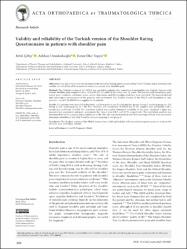| dc.contributor.author | Çiftçi, Betül | |
| dc.contributor.author | Uzunkulaoğlu, Aslıhan | |
| dc.contributor.author | Topçu, Deniz Öke | |
| dc.date.accessioned | 2021-12-12T16:51:29Z | |
| dc.date.available | 2021-12-12T16:51:29Z | |
| dc.date.issued | 2021 | |
| dc.identifier.issn | 1017-995X | |
| dc.identifier.uri | https://doi.org/10.5152/j.aott.2021.19068 | |
| dc.identifier.uri | https://app.trdizin.gov.tr/makale/TkRRMU56RTJOZz09 | |
| dc.identifier.uri | https://hdl.handle.net/20.500.11857/2562 | |
| dc.description.abstract | Objectives: The aim of this study was to translate The Self-Reported Foot and Ankle Score (SEFAS) into Turkish and to determinethe validity and reliability of the translated version in patients shoulder pain.Material and Methods: The Turkish version of the Shoulder Rating Questionnaire (SRQ-T) was applied to patients aftertranslation from English into Turkish. Patients with various shoulder pain complaint were included into the study if theywere over 18 years. The patients with mixed-type pain, cancer pain, headache, substance abuse, severe depression, andfibromyalgia syndrome were excluded. The musculoskeletal and neurological examinations of the patients were performed.The Turkish version of the Shoulder Rating Questionnaire (SRQ-T) and Disabilities of arm, shoulder, hands-T (DASH-T) wereapplied to all patients.Results: 122 patients were included in the study, and then patients are divided into two groups: Group 1, working group (n = 72);Group 2, non- working group (n = 50). The reliability and consistency of SRQ-T for all the samples were acceptable with aCronbach’s coefficient of 0.979. The test-retest method was used to determine reliability of the scale. Cronbach’s alpha wasmeasured pre-assessment and post- assessment; the values were 0.815 and 0.770, respectively. The correlation analysis wasdetermined for all the samples and calculated as 0.780. Also, the test-retest method with Wilcoxon Signed Rank Test was used todetermine reliability of the SRQ- T and its domains in group 1 and group 2.Conclusion: The Turkish version of the SRQ-T seems to be a valid and reliable self-administered questionnaire to evaluate theshoulder pain in Turkish patients.Level of Evidence: Level II, Diagnostic Study | en_US |
| dc.language.iso | eng | en_US |
| dc.relation.ispartof | Acta Orthopaedica et Traumatologica Turcica | en_US |
| dc.identifier.doi | 10.5152/j.aott.2021.19068 | |
| dc.rights | info:eu-repo/semantics/openAccess | en_US |
| dc.subject | [No Keywords] | en_US |
| dc.title | Validity and reliability of the Turkish version of the shoulder rating questionnaire in patients with shoulder pain | en_US |
| dc.type | article | |
| dc.department | Fakülteler, Sağlık Bilimleri Fakültesi, Fizyoterapi ve Rehabilitasyon Bölümü | |
| dc.identifier.volume | 55 | en_US |
| dc.identifier.startpage | 208 | en_US |
| dc.identifier.issue | 3 | en_US |
| dc.identifier.endpage | 212 | en_US |
| dc.relation.publicationcategory | Makale - Uluslararası Hakemli Dergi - Kurum Öğretim Elemanı | en_US |
| dc.identifier.wos | WOS:000657568500005 | en_US |
| dc.identifier.scopus | 2-s2.0-85107835780 | en_US |
| dc.identifier.pmid | PubMed: 34100360 | en_US |



















